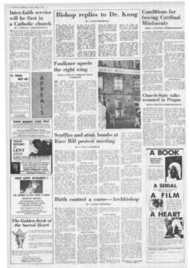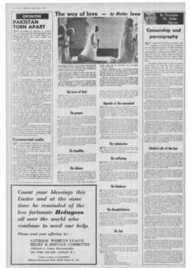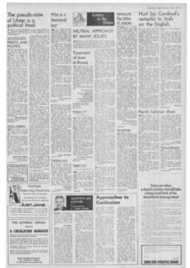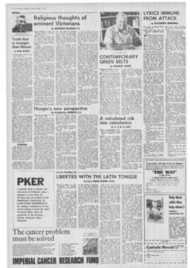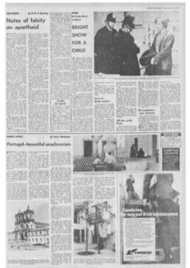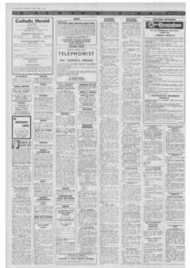Page 1, 2nd April 1971
Page 1

Report an error
Noticed an error on this page?If you've noticed an error in this article please click here to report it.
Tags
Share
Related articles
Pope May See Tito In Rome
Middle East Tension Discussed At Vatican
Charter Urged For War Protesters
President Tito May Be Received By Pope Paul P Resident Tito
Vatican Tito Pact Is Ready For Signing
70-MINUTE DISCUSSION AT THE VATICAN
Pope and Tito agree on aims for peace
FROM ALAN McELWAIN IN VATICAN CITY
pOPE PAUL and President Tito of Communist Yugo' slavia hold 'Similar or identical' views on international peace problems and the need for peaceful co-existence, the President said after a meeting with the Pope on Monday.
Pope Paul and President Tito met for more than 70 minutes. The Middle East and the welfare of Catholics in Yugoslavia were among topics discussed.
Yugoslavia, with a population of 20 million, of which six million are Catholics, is the only Communist country with normal diplomatic relations With the Vatican. These were fully restored last August.
President Tito, in black tails and a jaunty top halt, made the first official visit any Communist head of state has ever made to the Pope. The Yugoslav flag, with a red star in the centre, flew alongside the Holy Sec's flag on Vatican buildings and also on the Vatican car in which the President drove to his audience.
"We think with respect and affectionate esteem of your country and its peoples, who are very dear to us, for many reasons," Pope Patti told PreSident Tito.
Special vocation
Foremost among these was the Christian faith which, for centuries "has enlightened a large part of your peoples who, in the plans of Providence, seem to have been destined for the special vocation of trying to form a point of encounter, and of mutual comprehension, with a view to sparing the continent new conflicts and indicating to it the road of collaboration between nations," Pope Paul told the President.
Under President Tito's direct inspiration and guidance. Yugoslavia seemed to respond. at present, by extending its international influence beyond the frontiers of Europe, the Pope added. He assured the President how sincerely he hoped for the success of any initiative aimed at the defence and restoration of peace, or the establishment of batter and more fruitful relations between the nations of all continents.
He thanked President Tito for appreciating his 'own multiple efforts' towards peace and brotherly collaboration between peoples. He was happy to note that, precisely in this field, a rapprochement between Yugoslavia and the Holy See had been possible in the last few years—"a rapproehement Which experience has proved to be beneficial and which promises even more positive results."
Pope Paul said he was also profoundly convinced that true harmony between Church and State. based on the solid foundation of true respect for each other's independence and rights, was certainly an advantage to the Church, but no less to society, "because religious peace is in itself a precious contribution to the serenity of national life."
Human dignity The Pope said he had noted with interest that principles 9ike the 'humanisation of the social milieu', 'respect for human dignity'. `man's general development as a free person' and the 'strengthening of solidarity and collaboration between men' formed part of Yugoslavia's constitution.
President Tito spoke of the 'positive evolution of our national respect,' and said that Yugoslavia was engaged in maximum peace efforts in the Middle East crisis. A strong supporter of the Arab cause, he said a Middle East settlement should eliminate the consequences of the June 1967 Arah-Israeli war, and affected countries should be able to live in peace and security, and accelerate the liquidation of colonisation and all forms of subordination and discrimination.
He also said he was troubled by latest developments in South-East Asia and Africa, areas where "entire nations are exposed to great suffering and deprived of elementary rights by the brutal use of force."
After the meeting, Pope Paul praised President Tito for seeking 'peace and international collaboration' and he called for 'a negotiated and fair solution of the conflicts in the Middle East and Indochina,' which would give tranquillity to these nations.
Some reports later said that President Tito asked the Pope for Church help in preventing separatism in Yugoslavia.
After meeting President Tito the Pope, who has been suffering from a slight cold, cancelled three private audiences.
blog comments powered by Disqus



